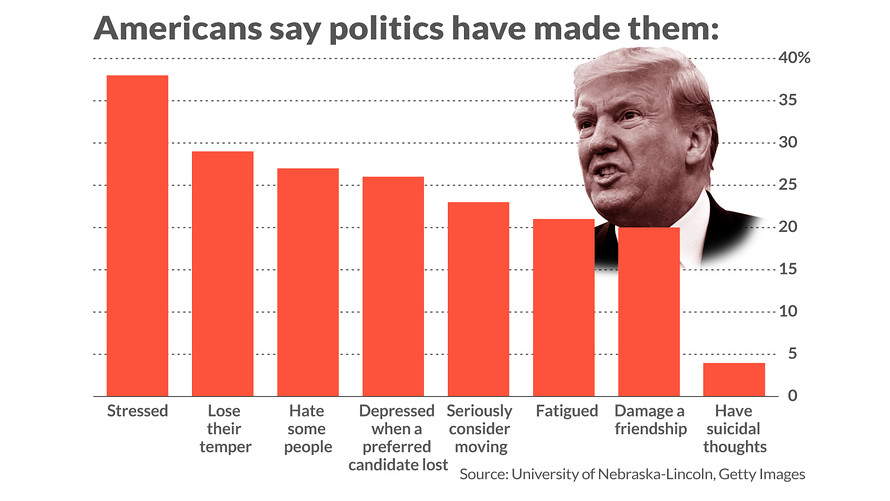Even before the Trump impeachment inquiry began dominating news coverage and watercooler conversations this week, politics were already dividing many Americans from their sanity.
University of Nebraska–Lincoln researchers surveyed 800 Americans about the physical, social and emotional effects of today’s often heated and hyperpartisan political discourse. Many respondents reported feeling stressed and losing both friends and sleep as the polarized country heads toward a contentious 2020 presidential election.
Almost 40% said politics had “stressed” them out, and about 32% agreed watching media outlets featuring views opposite their own drove them “crazy.”
Many also reported caring “too much” about which candidates win and lose (22%), or spending more time thinking about politics than they would like (26%). Indeed, more than one in four (26%) said they became “depressed” when their preferred candidate lost.
And, most alarmingly, 4% said they have had suicidal thoughts. Lead author and political scientist Kevin Smith noted that it’s quite a small proportion, but still a noteworthy one. “That translates into 10 million adults,” he said in a statement.

Voters aren’t just suffering mental and emotional fatigue. About one in five reported losing sleep, and more than 10% complained of nonspecific health issues. One in five also said that a friendship had been “damaged” as the result of a political argument.
“Politics is really negatively affecting a lot of people’s lives, or at least, they’re perceiving that politics is really negatively affecting their lives in deep and meaningful ways,” added Smith.
This has been an issue for some time, and it appears to be getting worse. The American Psychological Association’s 2016 “Stress in America” survey of 3,400 American adults found that 63% saw the country’s future as “a significant source of stress,” and 56% said they were stressed by the political climate at that time.
By 2018, the APA reported that the number of people pinning their stress on politics had risen to 69%, while those who said the political climate was stressful had jumped to 62%.
Stress and anger have also been increasing among Americans, in general, and particularly among people between the ages of 15 and 49, according to a Gallup poll earlier this year.
Read more: Americans’ stress levels just hit a record high — and this group is suffering the most











